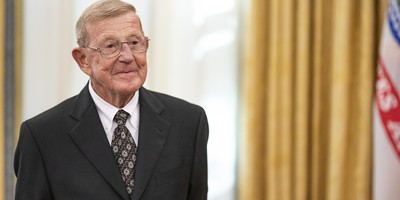Reading Patrick Poole's splashy coverage of the FBI's VIP treatment of Kifah Mustapha -- a known Hamas operative and unindicted co-conspirator in the landmark Holy Land Foundation terror financing trial -- will make your head spin with the dizzying question:
How could the same officials charged with securing the nation against the very terrorism Mustapha's activities supported (as laid out in court documents filed by federal investigators) have possibly invited him into the top-secret National Counterterrorism Center (NCTC) and the FBI's training center at Quantico during a six-week "Citizen's Academy" hosted by the FBI as "outreach" to the Muslim community?
"The plugs had to be pulled on our (watch) system" just to get Mustapha in the NCTC door, Poole, writing online at Big Peace, quoted a Department of Homeland Security official as saying. After all, "the NCTC has Kifah Mustapha on the highest watch list we have."
Unbelievable. So who pulled those plugs? Wouldn't it be great to get a bunch of national security pooh-bahs into one room to try to find out?
It would be -- and so it was. This week, a passel of senior national security officials assembled for a Washington conference on domestic intelligence sponsored by the Bipartisan Policy Center. First up was James Clapper, director of National Intelligence. During question-and-answer session, I asked him about FBI "outreach" to Mustapha.
"I think the FBI will be here later," Clapper boldly punted (laughter in the room). Meanwhile, he continued, there is "great merit in outreach, to engage as much as possible with the Muslim community." Subtext: It's no big.
When later asked about the government policy of eliminating the terminology of Islamic jihad from intelligence analysis and collection, Clapper affirmed it to "acknowledge sensitivities" -- a process begun under George W. Bush and recently extended by Homeland Security adviser John Brennan. "There's plenty of terminology out there (to convey) the meaning and the message that we need to."
Recommended
The director of national intelligence's meaning and message of choice: "homegrown violent extremism."
Between panels, I spoke to panelist Sean Joyce of the FBI. What did the FBI executive assistant director for national security think about the Mustapha incident?
"We don't comment on individuals," he told me.
OK. How about commenting on a blanket policy regarding FBI tours for unindicted co-conspirators and terrorist group operatives?
"Again, we don't comment on individuals."
It's not every day a former director of Central Intelligence Agency is standing by, so I asked Michael Hayden for his opinion of the speak-no-Islam issue. "People I trust" -- uh-oh -- "say to be careful not to use the term `jihadist' because it does have a broader use across the Islamic world," he said.
So what? That doesn't affect its accuracy as a description of the enemy! However, he continued, not using the word `Islamic' "obfuscates the issue (and) neuters our understanding" of Islamic terrorism -- "however perverted it might be." Hayden added: "This is in no way a comment on the Islamic faith."
But it is in some way a comment on American intelligence. Political correctness stymies it.
Of course, NCTC Director Michael Leiter was quick to insist "there was no PC-ness" on his watch. "If someone is inspired by Islamic ideology --" he began, then stopped. "Let me rephrase that: al-Qaida ideology ..."
Poor baby.
Later, I had an opportunity to ask Leiter what he thought about the FBI bringing Mustapha into NCTC.
"Ask the FBI," he suggested, helpfully. But isn't NCTC your shop? I asked.
"Actually," he explained, "the building isn't owned by us. Three organizations have offices there. ..."
When I pulled myself up off the floor, he was still talking: "It's more complicated -- talk to the FBI. They've got a lot more information than I do."
The FBI better be good, right? After all, on taking my Mustapha question, FBI Director Robert Mueller, the conference's final speaker, said he'd been briefed to expect it. "I'm not sure I agree with the predicate of your question," he said, "and we're not going to debate it here."
He continued, discussing the Citizen's Academy program, which he described as "exposing the FBI to a variety of communities."
"Exposing" is right.
He, too, said he wouldn't discuss individuals, but added, meaningfully: "We do look into the individuals that we invite into the Citizen's Academies."
I think the man who pulled the plugs had spoken.

























Join the conversation as a VIP Member